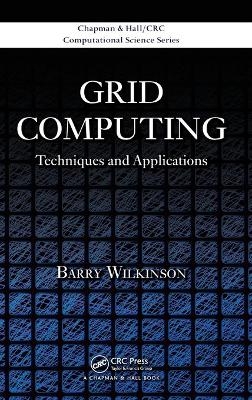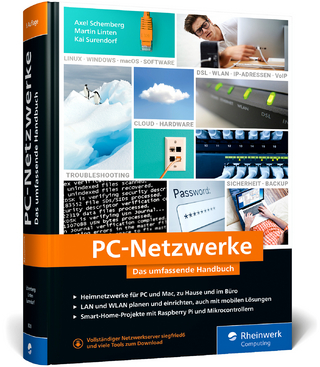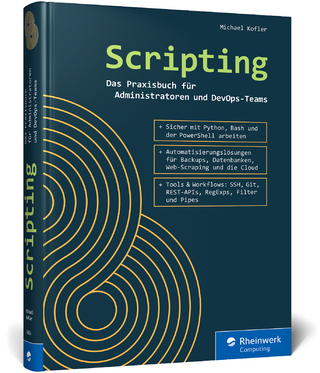
Grid Computing
Techniques and Applications
Seiten
2009
Chapman & Hall/CRC (Verlag)
978-1-4200-6953-2 (ISBN)
Chapman & Hall/CRC (Verlag)
978-1-4200-6953-2 (ISBN)
Suitable for senior undergraduate and first-year graduate students, this book covers the varied and interconnected aspects of Grid computing, including how to design a system infrastructure and Grid portal; job submission and scheduling; Grid security; Grid computing services and software tools; workflow editors; and, Grid-enabling applications.
Designed for senior undergraduate and first-year graduate students, Grid Computing: Techniques and Applications shows professors how to teach this subject in a practical way. Extensively classroom-tested, it covers job submission and scheduling, Grid security, Grid computing services and software tools, graphical user interfaces, workflow editors, and Grid-enabling applications.
The book begins with an introduction that discusses the use of a Grid computing Web-based portal. It then examines the underlying action of job submission using a command-line interface and the use of a job scheduler. After describing both general Internet security techniques and specific security mechanisms developed for Grid computing, the author focuses on Web services technologies and how they are adopted for Grid computing. He also discusses the advantages of using a graphical user interface over a command-line interface and presents a graphical workflow editor that enables users to compose sequences of computational tasks visually using a simple drag-and-drop interface. The final chapter explains how to deploy applications on a Grid.
The Grid computing platform offers much more than simply running an application at a remote site. It also enables multiple, geographically distributed computers to collectively obtain increased speed and fault tolerance. Illustrating this kind of resource discovery, this practical text encompasses the varied and interconnected aspects of Grid computing, including how to design a system infrastructure and Grid portal.
Supplemental Web ResourcesThe author’s Web site offers various instructional resources, including slides and links to software for programming assignments. Many of these assignments do not require access to a Grid platform. Instead, the author provides step-by-step instructions for installing open-source software to deploy and test Web and Grid services, a Grid computing workflow editor to design and test workflows, and a Grid computing portal to deploy portlets.
Designed for senior undergraduate and first-year graduate students, Grid Computing: Techniques and Applications shows professors how to teach this subject in a practical way. Extensively classroom-tested, it covers job submission and scheduling, Grid security, Grid computing services and software tools, graphical user interfaces, workflow editors, and Grid-enabling applications.
The book begins with an introduction that discusses the use of a Grid computing Web-based portal. It then examines the underlying action of job submission using a command-line interface and the use of a job scheduler. After describing both general Internet security techniques and specific security mechanisms developed for Grid computing, the author focuses on Web services technologies and how they are adopted for Grid computing. He also discusses the advantages of using a graphical user interface over a command-line interface and presents a graphical workflow editor that enables users to compose sequences of computational tasks visually using a simple drag-and-drop interface. The final chapter explains how to deploy applications on a Grid.
The Grid computing platform offers much more than simply running an application at a remote site. It also enables multiple, geographically distributed computers to collectively obtain increased speed and fault tolerance. Illustrating this kind of resource discovery, this practical text encompasses the varied and interconnected aspects of Grid computing, including how to design a system infrastructure and Grid portal.
Supplemental Web ResourcesThe author’s Web site offers various instructional resources, including slides and links to software for programming assignments. Many of these assignments do not require access to a Grid platform. Instead, the author provides step-by-step instructions for installing open-source software to deploy and test Web and Grid services, a Grid computing workflow editor to design and test workflows, and a Grid computing portal to deploy portlets.
Barry Wilkinson is a professor of computer science and the director of the computer science master’s program at the University of North Carolina at Charlotte.
Introduction to Grid Computing. Job Submission. Schedulers. Security Concepts. Grid Security. System Infrastructure I: Web Services. System Infrastructure II: Grid Computing Services. User-Friendly Interfaces. Grid-Enabling Applications. Appendices. Glossary. Answers to Self-Assessment Questions. Index.
| Erscheint lt. Verlag | 6.10.2009 |
|---|---|
| Reihe/Serie | Chapman & Hall/CRC Computational Science |
| Zusatzinfo | 15 Tables, black and white; 164 Illustrations, black and white |
| Sprache | englisch |
| Maße | 156 x 234 mm |
| Gewicht | 703 g |
| Themenwelt | Mathematik / Informatik ► Informatik ► Netzwerke |
| ISBN-10 | 1-4200-6953-5 / 1420069535 |
| ISBN-13 | 978-1-4200-6953-2 / 9781420069532 |
| Zustand | Neuware |
| Haben Sie eine Frage zum Produkt? |
Mehr entdecken
aus dem Bereich
aus dem Bereich
das umfassende Handbuch für den Einstieg in die Netzwerktechnik
Buch | Hardcover (2023)
Rheinwerk (Verlag)
29,90 €
das Praxisbuch für Admins und DevOps-Teams
Buch | Hardcover (2023)
Rheinwerk (Verlag)
39,90 €


